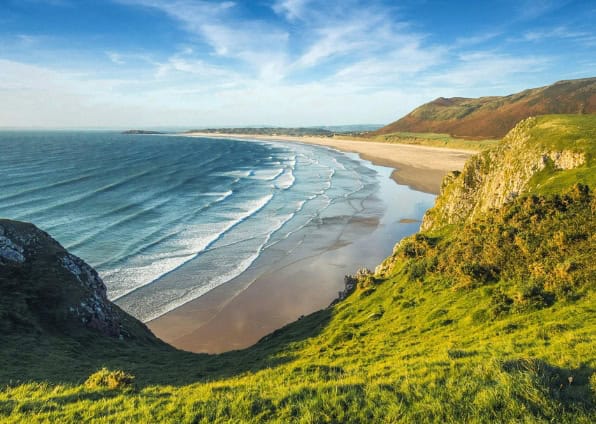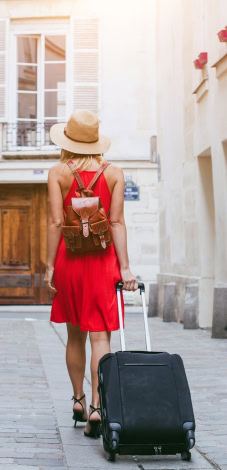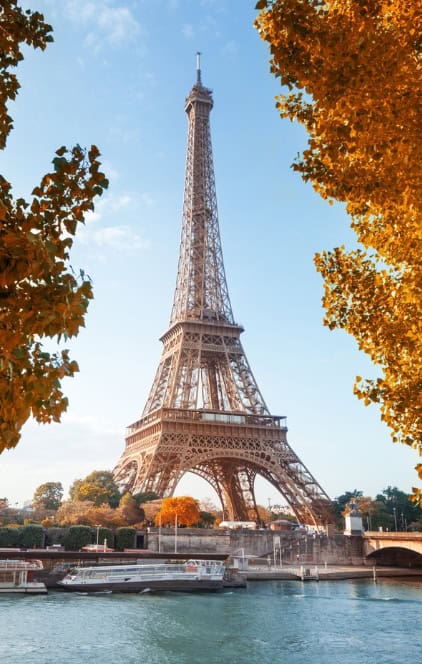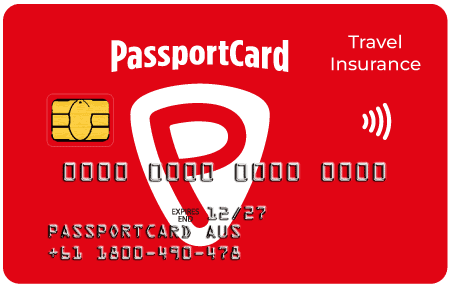

France Travel Guide
Whether you most want to visit for the art and museums, the architecture, the landmarks, the fashion and shopping, the cuisine or the wine and champagne, France is one corner of the globe that features highly on most travellers’ destination wish lists.
If you’re lucky enough to be heading to the land of cheese and wine in the not-too-distant future, this handy travel guide is filled with useful information to help you get a real taste of what France has to offer.
Best ways to experience France
Visiting France can be a delightful, yet slightly overwhelming endeavour. As a country that boasts a seemingly endless list of cultural, historical and culinary experiences, it can be hard to know which must-see attractions to include on your itinerary, and those you might prefer to save for your next trip to France.
To help you plan your upcoming trip, here are some of our favourite activities and attractions that are well worth it if you want an unforgettable French experience.
- Pay a visit to ‘la tour Eiffel’ – It goes without saying, but every visitor to Paris absolutely must become acquainted with this architectural masterpiece that is one of the most instantly recognisable structures in the world. While you’ll be able to catch glimpses of the famous tower from numerous locations around Paris, it’s worthwhile paying a visit to the tower itself. Drop into a patisserie, grab a takeaway baguette and plant yourself in the surrounding parklands while taking in both the tower and the atmosphere.
- Stroll along the Champs-Élysées – Set off from the Tuileries Gardens and slowly stroll along the Champs-Élysées to take in the sights and sounds of one the most famous avenues in the world. The avenue will eventually lead you to the Arc de Triomphe, which if you’re willing to climb the 284 steps, will reward you with breathtaking views across Paris.
- Explore Montmartre – To get a slightly different perspective of Paris, Montmartre showcases the more bohemian side of Paris with its narrow winding streets, cafés and artistic vibe. While there, make sure you also pay a visit to the Sacre-Cœur Basilica where you’ll encounter stunning panoramic views across Paris.
- Take a tour of a wine region – Whether it’s Bordeaux, Burgundy or Champagne, exploring one of France’s world-renowned wine regions is a coveted experience that will deliver an authentic taste of France. Take a vineyard tour, sample the local wines and immerse yourself in the world of French viticulture.
- Become acquainted with the Palace of Versailles – A magnificent masterpiece of French Baroque architecture, the Palace of Versailles with its rich history and stunning gardens is a UNESCO World Heritage site where you can gain an insight into five centuries of French history. Discover attractions like the Hall of Mirrors and the King’s Grand Apartments, or gain access to some of the lesser-known locations within the palace by joining a guided tour.
- Relax on the French Riviera – From the beaches of Nice or Cannes to the charming streets of Saint-Tropez, the French Riviera (or Côte d’Azur) is famed for its glamorous coastal cities, bright blue waters and sun-kissed beaches. While the region is synonymous with luxury, there are ways to enjoy its beauty without spending a fortune by choosing budget-friendly accommodation, sticking to public transport and opting for free or low-cost activities such as beach visits or exploring the local markets.
Visiting France
Climate
France experiences a diverse range of climates due to its varied geography, but generally has a temperate climate with distinct seasons.
In the northern regions, including Paris, winters can be cool with occasional snowfall, while summers are mild to warm. The southern regions, such as Provence and the French Riviera, enjoy a Mediterranean climate characterised by hot, dry summers and mild, wet winters. Mountainous areas, such as the Alps and Pyrenees, have alpine climates with colder temperatures and significant snowfall in winter.
Spring (April to June) and early autumn (September to October) are usually good times to visit France. During these months, the weather is generally pleasant with mild temperatures and fewer crowds compared to the peak summer season (July and August).
Culture and language
The official language of France is French (Français). French is spoken by the majority of the population, however, several regional languages such as Breton, Occitan, Alsatian and Corsican are spoken in specific areas.
Many French people are accustomed to interacting in English in urban areas such as Paris, Nice and Lyon and you can generally find English speakers in hotels, restaurants and tourist attractions. Learning a few basic phrases in French and ensuring you have access to a translation app can be helpful and appreciated by many of the locals.
The culture of France is rich and diverse and has made profound contributions to art, literature, philosophy and cuisine. The French take pride in their language, and cultural activities such as cinema, fashion and music are integral parts of national identity. Additionally, France is known for its emphasis on socialising, with café culture playing a significant role in daily life.
French culture also strongly emphasises intellectual pursuits, and the concept of “joie de vivre” (or the joy of living) reflects an appreciation for the finer things in life and a focus on quality experiences.
Getting around
Major cities in France typically have well-developed public transportation systems, including efficient metro and bus networks. In cities like Paris and Lyon, the metro is a fast and convenient way to get around. Buses, taxis and ride-sharing services can also be a great way to get around, however, traffic in locations such as Paris can be notoriously challenging. Walking and bike-sharing programs are other popular options that allow you to explore the city and various landmarks at a leisurely pace.
For inter-city travel, the high-speed train (TGV) is a popular choice, connecting major cities quickly and comfortably. Renting a car can be ideal for exploring rural regions or picturesque countryside, providing flexibility and access to charming villages.
Accommodation
You’ll find various accommodation options throughout France including hotels, bed and breakfasts, private holiday home rentals, backpacker hostels and guest houses. Gîtes, which are holiday cottages or self-catering accommodation, are also common in more rural areas.
Accommodation can be expensive in some locations in France, so it’s worthwhile doing your research to find the most suitable option/s.
Entry requirements
France forms part of the Schengen Area, a group of European countries which allows Australians to travel freely for tourism purposes without a visa for up to 90 days.
It’s always a good idea to visit the Australian government’s Smartraveller website and the website for your closest French embassy before your trip for the latest information and updates about travelling to France.
All benefits and covers are subject to the terms, conditions, limitations and exclusions listed in the Combined Financial Services Guide and Product Disclosure Statement (PDS) and on other policy documentation, including the schedule.
Please refer to the relevant PDS before purchasing our travel insurance to understand what is, and is not, covered by the policy to ensure it is the right cover for you.
France travel insurance FAQs
It’s always a good idea to get travel insurance when travelling to France so you know you’re prepared if something doesn’t go to plan. From lost luggage to travel delays, trip cancellations, medical issues or dental emergencies, travel insurance can come in handy in a variety of situations. Choosing cover that also offers instant claims can also be invaluable while travelling abroad.
The best way to find out how much it will cost to get cover to travel to France is to get an instant quote with PassportCard. It only takes a couple of minutes to get a personalised quote by providing some basic details such as your age, destination/s, travel dates and the level of cover you would like.
No. Many Australians don’t realise that they won’t be covered by Medicare when overseas. Purchasing travel insurance with cover for medical emergencies and evacuation is essential to ensure you won’t be left to foot the bill if you become seriously sick or injured while travelling.
Simply call our Global Assistance team on +61 1800 490 478 or contact us on WhatsApp. Our Australian-based Global Assistance team is available 24/7 and can quickly handle most common claims on-the-spot over the phone.
Absolutely. Simply add Winter Sports Comprehensive cover when you complete your quote and the cover will be automatically included with your travel insurance policy. Make sure you read the relevant PDS prior to purchase as inclusions can vary depending on the type of policy you choose.
Preparing for your trip to France
All set for your trip to France?
Make sure you’ve ticked these items off your checklist before you head off:
- Check your passport is valid with at least 6 months of validity left from the date you plan to leave the country
- Ensure you meet the visitor entry requirements for France
- Speak to your doctor to find out if you require any travel vaccinations
- Arrange a travel currency card or another method of payment to cover expenses while you’re away. It’s also a good idea to take some Euro (EUR) with you as some places may prefer cash payments
- Notify your financial institution of your plans to travel
- Contact your phone provider to ensure your phone plan will cover you while you’re away or purchase a pre-paid international sim card
- Arrange accommodation for each location you plan to stay in
- Consider booking any tours or activities you want to do in advance – this is particularly important if you want to access major attractions like the Eiffel Tower, the Louvre museum, the Palace of Versailles or Musée d’Orsay during peak tourist season, as tickets can book out well in advance
- Provide details of your travel plans to a family member or close friend not travelling with you so you can be contacted in case of an emergency
- Research the local laws as some rules can vary from what you may be used to in Australia – for example, in France it’s illegal not to offer help to a person in danger, even as a tourist
- Save the details of how to access emergency consular assistance in case you need it
- Organise your travel insurance with PassportCard.
Get covered for your trip to France with PassportCard



Instant payouts on approved claims with PassportCard
When you choose PassportCard, you’ll enjoy the extra peace of mind of knowing you’ll be able to cover most expenses there and then if something goes wrong.
When you purchase one of our travel insurance policies, we’ll ask you if you’d like a PassportCard to take with you on your trip. If something happens while you’re away (like your luggage is delayed, your cash is stolen or you experience a medical issue), our team can handle your claim quickly over the phone and transfer funds to your PassportCard on-the-spot**.
If approved, you’ll be able to withdraw cash to cover expenses that can arise from things like delayed luggage or stolen cash, or if it’s a medical issue, we can instantly add funds to your PassportCard so you can immediately pay for expenses when you need to.
You won’t need to fill out any paperwork and instant access to funds means you won’t be left out of pocket.
Find out more about how instant claims work or get a quote for your upcoming trip.












